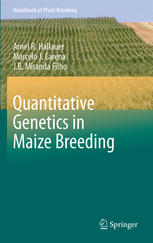

Most ebook files are in PDF format, so you can easily read them using various software such as Foxit Reader or directly on the Google Chrome browser.
Some ebook files are released by publishers in other formats such as .awz, .mobi, .epub, .fb2, etc. You may need to install specific software to read these formats on mobile/PC, such as Calibre.
Please read the tutorial at this link: https://ebookbell.com/faq
We offer FREE conversion to the popular formats you request; however, this may take some time. Therefore, right after payment, please email us, and we will try to provide the service as quickly as possible.
For some exceptional file formats or broken links (if any), please refrain from opening any disputes. Instead, email us first, and we will try to assist within a maximum of 6 hours.
EbookBell Team

5.0
90 reviewsHandbook of Plant Breeding Arnel R. Hallauer • Marcelo J. Carena • J.B. Miranda Filho Quantitative Genetics in Maize Breeding Public investment in maize breeding from 1865 to 1996 was $3 billion (Crosbie et al., 2004) and the return on investment was $260 billion as a consequence of applied maize breeding, even without full understanding of the genetic basis of heterosis. Quantitative genetics has allowed the integration of prebreeding with cultivar development by characterizing populations genetically, adapting them to places never thought of (e.g., tropical to short seasons), improving them by all sorts of intra and inter population recurrent selection methods, extracting lines with more prob ability of success, and exploiting inbreeding and heterosis. Quantitative Genetics in Maize Breeding aims to increase awareness of the relative value and impact of maize breeding for food, feed, and fuel security. Without breeding programs continuously developing improved germplasm, no technology can develop improved cultivars. This volume presents principles and data that can be applied to maximize genetic im provement of germplasm and develop superior genotypes in different crops. This is a unique and permanent contribution to breeders, geneti cists, students, policy makers, and land grant institutions still promoting quality research in applied plant breeding as opposed to promoting grant monies and indirect costs at any short term cost. The book is dedicated to those who envision the development of the next generation of cultivars with less need of water and inputs, with better nutrition; and with higher percentages of exotic germplasm as well as those that pursue independent research goals before searching for funding. Arnel R. Hallauer is C. F. Curtiss Distinguished Professor in Agriculture (Emeritus) at Iowa State University (ISU). Dr. Hallauer has led maize breeding research for mid season maturity at ISU since 1958. His work has had a worldwide impact on plant breeding programs, industry, and students and was named a member of the National Academy of Sciences. Hallauer is a native of Kansas, USA. M.J. Carena is professor of plant sciences at North Dakota State University (NDSU). Dr. Carena has led maize breeding research for short season maturity at NDSU since 1999. This program is currently one the of the few public U.S. programs left integrating pre breeding with cultivar development and training in applied maize breeding. He teaches Quantitative Genetics and Crop Breeding Techniques at NDSU. Carena is a native of Buenos Aires, Argentina. http://www.ag.ndsu.nodak.edu/plantsci/faculty/Carena.htm J. B. Miranda Filho is full professor in the Department of Genetics, Escola Superior de Agricultura Luiz de Queiroz University of São Paulo located at Piracicaba, Brazil. His research interests have emphasized development of quantitative genetic theory and its application to maize breeding. Miranda Filho is native of Pirassununga, São Paulo, Brazil. life sciences